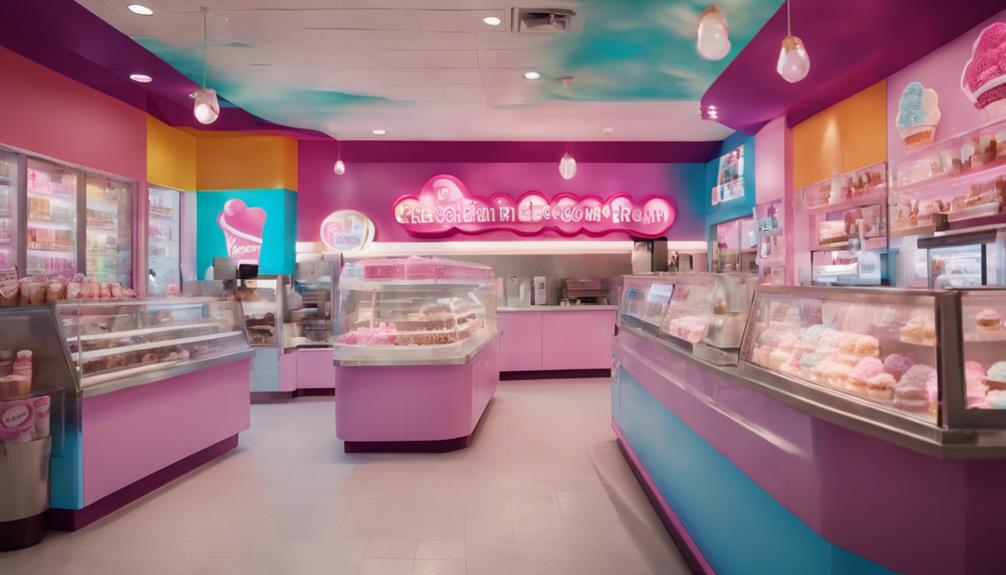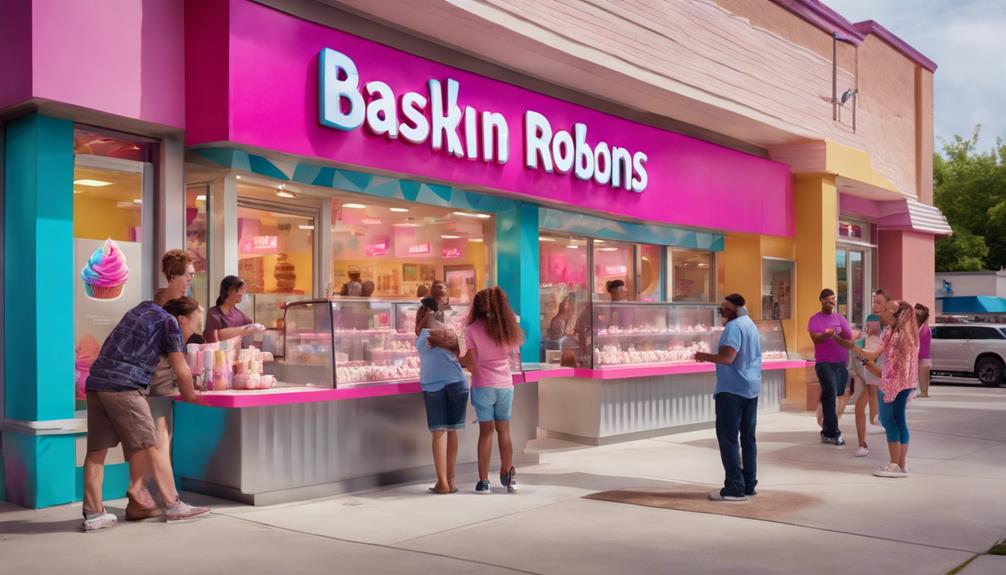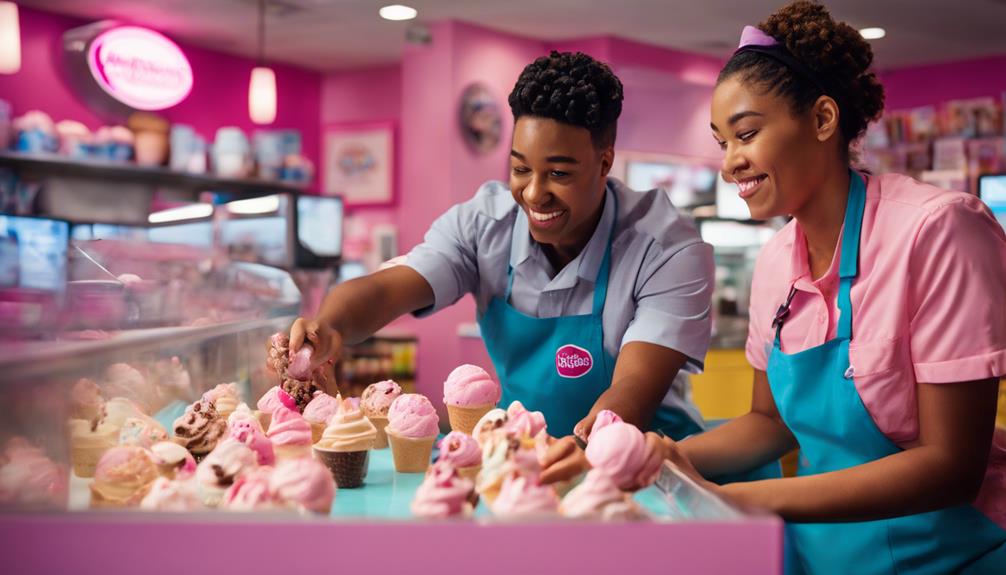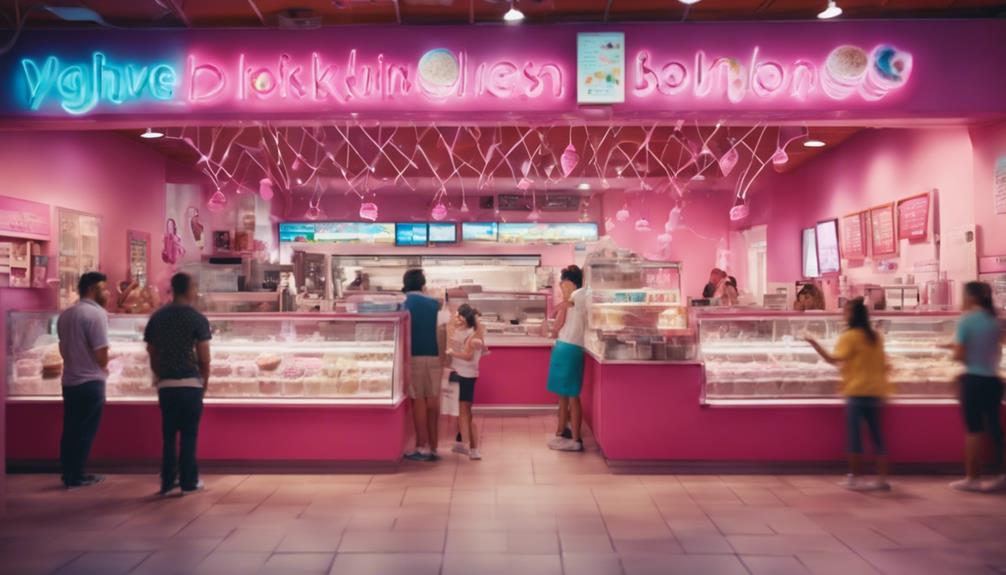Joining the Baskin-Robbins franchise revolution presents a unique opportunity for aspiring entrepreneurs. With over 7,600 locations worldwide, Baskin-Robbins boasts a strong brand identity and loyal customer base. Franchisees benefit from thorough training, operational flexibility, and ongoing support. The initial investment starts around $300,000, including a $25,000 franchise fee. Ongoing royalties guarantee that franchisees tap into a robust marketing strategy. Baskin-Robbins is committed to quality, innovation, and customer satisfaction, making it a beloved choice. For those intrigued by this rewarding venture, there's much more to explore about the potential and process involved.
Key Elements

In exploring the key elements of the Baskin-Robbins franchise, one finds a solid company overview that highlights its rich history and brand recognition.
The business model not only emphasizes the importance of customer satisfaction but also provides aspiring franchisees with essential information for success.
Understanding these components is vital for anyone looking to invest in this iconic ice cream brand.
Company Overview
Baskin-Robbins, founded by Burt Baskin and Irv Robbins, has become a globally recognized brand known for its diverse range of ice cream flavors and cakes.
Operating as a subsidiary of Dunkin while offering independent franchise opportunities, the brand appeals to aspiring entrepreneurs seeking a balance of flexibility and corporate support.
With a total of 7,682 units as of 2023, strong brand loyalty guarantees a solid customer base from day one.
Franchisees are encouraged to focus on customer satisfaction and creating smiles through their offerings.
Baskin-Robbins continues to expand its franchise network, presenting significant growth potential for passionate business owners dedicated to the ice cream industry.
Business Overview
Aspiring entrepreneurs can find a unique opportunity in the Baskin-Robbins franchise, which combines a beloved brand with a proven business model focused on customer satisfaction and growth.
Founded in California, Baskin-Robbins boasts a global presence with over 7,600 locations. The franchise's strong brand loyalty guarantees a solid customer base from day one.
Franchisees benefit from corporate support while enjoying flexibility in their operations. With multiple location types, including traditional and nontraditional setups, entrepreneurs can choose the best fit for their market.
The franchise's expansion efforts present significant growth potential, making it ideal for those passionate about ice cream and dedicated to creating memorable customer experiences.
Information for Franchisees
Franchisees benefit from extensive training and ongoing support, ensuring they're well-equipped to operate their business successfully.
They receive up to 40 hours of on-the-job training and 90 hours of classroom training, typically conducted over three weeks at Dunkin Brands headquarters. Additional training may take place in California, providing hands-on experience at various locations.
Ongoing support helps franchisees navigate challenges and optimize operations.
Baskin-Robbins also offers exclusive territories to minimize competition among units, allowing for a more profitable venture.
With flexibility in ownership—absentee and part-time options—franchisees can tailor their involvement.
This thorough support system, combined with a globally recognized brand, positions franchisees for success in the competitive ice cream market.
Company Overview

Founded by Burt Baskin and Irv Robbins, Baskin-Robbins has built its reputation on customer happiness and quality ice cream.
With a competitive flavor variety, the brand continuously attracts ice cream lovers around the world.
This commitment to excellence has solidified its place as a leader in the franchise industry.
Founders Burt and Irv Robbins
Creating a legacy in the ice cream industry, Burt Baskin and Irv Robbins established Baskin-Robbins in Glendale, California, where their passion for unique flavors quickly turned into a global phenomenon.
Their vision centered on providing a diverse range of ice cream flavors, famously introducing the concept of 31 flavors, one for each day of the month. This innovative approach resonated with customers, fostering brand loyalty and setting the stage for rapid expansion.
Over the years, they built a franchise model that empowered aspiring entrepreneurs to share in their success.
Today, Baskin-Robbins operates thousands of locations worldwide, thanks to the foundation laid by these pioneering founders, who transformed a simple ice cream shop into an iconic brand.
Customer Happiness and Quality
Customer happiness and quality are at the heart of Baskin-Robbins' mission, ensuring that every scoop of ice cream brings joy to its patrons. The brand prides itself on crafting delicious flavors and maintaining high standards, which keeps customers coming back for more.
With a commitment to freshness, each location sources quality ingredients, creating a memorable experience. Baskin-Robbins also values customer feedback, continuously improving its offerings based on preferences and trends.
Franchisees play an essential role in this mission, focusing on delivering exceptional service and creating a welcoming atmosphere. This dedication to customer satisfaction not only fosters loyalty but also enhances the brand's reputation, making Baskin-Robbins a beloved choice for ice cream lovers everywhere.
Founders Burt and Irv Robbins
Burt Baskin and Irv Robbins established Baskin-Robbins in 1945, combining their passion for ice cream with a vision to offer an unparalleled variety of flavors that would delight customers. Their entrepreneurial spirit flourished in Glendale, California, where they built a brand that quickly gained recognition.
By focusing on quality and customer satisfaction, they fostered brand loyalty that remains strong today. Baskin-Robbins revolutionized the ice cream industry by introducing the concept of “31 flavors,” ensuring there's always something new and exciting for their patrons.
Their legacy continues to thrive under Dunkin's umbrella, offering aspiring franchisees a chance to share in their vision and create joyful experiences for communities worldwide.
Competitive Flavor Variety Analysis
Baskin-Robbins stands out in the ice cream market with its impressive selection of over 31 unique flavors, catering to diverse tastes and preferences. This extensive variety not only appeals to traditional ice cream lovers but also attracts adventurous customers seeking innovative combination options.
The brand consistently introduces new flavors while maintaining classic favorites, ensuring there's always something fresh for returning patrons. Additionally, the seasonal offerings create excitement and drive repeat visits.
This competitive flavor variety gives Baskin-Robbins a significant edge over its competitors, as it fosters brand loyalty and encourages customers to explore the menu. By focusing on flavor innovation and quality, Baskin-Robbins solidifies its position as a leader in the ice cream franchise industry.
Brand Identity

Baskin-Robbins stands as a global leader in the ice cream market, consistently drawing customers with its innovative and diverse flavor selection.
The brand's commitment to customer-centric service excellence sets it apart, ensuring that every visit feels special.
This unique blend of quality and variety strengthens its identity, making Baskin-Robbins a beloved choice for ice cream enthusiasts worldwide.
Global Ice Cream Market Leader
As a global ice cream market leader, the brand's identity is built on a legacy of innovation, quality, and unmatched flavor variety that captivates customers worldwide.
Baskin-Robbins stands out with its iconic 31 flavors, appealing to diverse tastes and preferences. The brand's commitment to using high-quality ingredients guarantees every scoop delivers an exceptional experience.
Through strategic marketing and a strong franchise network, Baskin-Robbins has successfully established itself as a household name in the ice cream industry. The company's focus on customer engagement and creative flavor development keeps it at the forefront of the market.
This combination of brand loyalty and a passion for ice cream makes Baskin-Robbins a prime choice for aspiring franchisees looking to join a successful legacy.
Customer-Centric Service Excellence
Customer-centric service excellence defines the Baskin-Robbins experience, ensuring every visitor feels valued and satisfied with their ice cream journey. This commitment to outstanding service fosters brand loyalty and keeps customers returning for more.
Employees are trained to provide friendly, knowledgeable assistance, creating a welcoming atmosphere that enhances the overall experience. Baskin-Robbins emphasizes understanding customer preferences, enabling staff to recommend flavors and options tailored to individual tastes.
This personalized approach not only elevates customer satisfaction but also strengthens the brand's identity as a leader in the ice cream industry. By prioritizing customer-centric values, Baskin-Robbins cultivates a community of ice cream lovers who appreciate the attention and care they receive, solidifying the brand's reputation in a competitive market.
Diverse Flavor Selection Advantage
Offering a staggering variety of ice cream flavors, Baskin-Robbins stands out as a leader in the industry, delighting customers with choices that cater to every taste and preference.
This diverse flavor selection not only enhances brand identity but also fosters customer loyalty, as patrons return to experience new and classic offerings.
With the iconic 31 flavors concept, Baskin-Robbins encourages creativity and exploration, making it an exciting destination for families and individuals alike.
The franchise's commitment to innovation, including seasonal and limited-time flavors, keeps the menu fresh and engaging.
This unique advantage positions Baskin-Robbins favorably in the competitive market, helping franchisees attract a broad customer base and guarantee sustained profitability.
Information for Franchisees

Understanding the essential information for franchisees is crucial for maneuvering the Baskin-Robbins opportunity effectively.
Franchisees benefit from extensive training programs, including up to 40 hours of on-the-job training and 90 hours of classroom instruction at Dunkin Brands headquarters. This training equips them with the skills needed to run their businesses successfully.
Baskin-Robbins also offers ongoing support, ensuring franchisees have access to resources and guidance throughout their journey.
Additionally, franchisees can choose from various location types, including traditional storefronts and nontraditional placements in airports or grocery stores.
With exclusive territories granted to minimize competition, franchisees can focus on building their brand and engaging customers from day one, positioning themselves for success in the ice cream industry.
Financial Requirements & Ongoing Fees

When considering a Baskin-Robbins franchise, potential owners need to be aware of the financial landscape.
The initial investment starts at $300,000, with a franchise fee of $25,000, alongside ongoing royalties of approximately 5.9% of gross sales and a promotional contribution of 5%.
Understanding these costs is essential for anyone looking to enter the franchise system successfully.
Estimated Startup Costs: $300,000+
Entrepreneurs looking to invest in a Baskin-Robbins franchise should anticipate startup costs starting at $300,000, reflecting the brand's commitment to quality and support. This initial investment covers various expenses, including equipment, inventory, and leasehold improvements. The overall investment can exceed $630,000 depending on location and additional amenities.
To qualify, prospective franchisees must have a minimum net worth of $200,000, along with $100,000 in liquid cash. Ongoing fees include a royalty of about 5.9% of gross sales and a 5% advertising fee, both vital for maintaining brand visibility and operational efficiency.
Understanding these financial requirements is essential for anyone considering joining the Baskin-Robbins franchise network.
25,000 Initial Franchise Investment
The initial franchise investment for Baskin-Robbins requires careful consideration of financial requirements and ongoing fees to guarantee a successful partnership with the brand.
Franchisees must pay a $25,000 initial franchise fee upon signing the agreement. The estimated total investment ranges from $293,840 to $642,360, depending on various factors like location and setup. A minimum net worth of $200,000 and at least $100,000 in cash is necessary for prospective owners.
Ongoing fees include royalty payments and advertising contributions, which are outlined in the franchise agreement and Franchise Disclosure Document (FDD).
Additionally, veteran incentives may waive the franchise fee for the first store, making it an appealing option for those with military backgrounds.
Approximately 5.9% of Sales
Ongoing royalty fees for Baskin-Robbins franchisees are approximately 5.9% of their gross sales, ensuring a continuous contribution to the brand's marketing and support efforts.
This fee structure allows franchisees to benefit from a robust marketing strategy and operational resources, which are crucial for driving sales and enhancing customer engagement.
It's essential for prospective franchisees to evaluate these fees when assessing their potential profits. Additionally, the franchise agreement outlines the detailed fee structure, ensuring transparency in financial obligations.
Promotional Contribution of 5%
Franchisees are required to contribute approximately 5% of their gross sales towards promotional efforts, enhancing brand visibility and customer engagement. This contribution supports various marketing initiatives, including advertising campaigns and promotional events that attract customers to their shops.
By pooling resources, franchisees benefit from a collective marketing strategy that amplifies their individual efforts and strengthens the overall brand presence. This financial commitment helps maintain a consistent brand image across all locations, ensuring customers recognize and trust the brand.
Additionally, these funds allow for the development of new marketing materials, digital advertising, and seasonal promotions, all designed to drive traffic and boost sales. Overall, this promotional contribution is essential for sustaining the franchise's competitive edge in the market.
Operational Supplies and Inventory
Operational supplies and inventory costs are essential for maintaining the quality and variety of products offered at Baskin-Robbins locations.
Franchisees need to budget for these recurring expenses, which include ingredients, packaging, and equipment. While the initial investment can range considerably, ongoing fees typically include a royalty of approximately 5.9% of gross sales and an additional 5% for advertising. This financial structure is designed to support both the franchisee and the brand's continued growth.
Franchisees must also plan for fluctuations in inventory needs, especially during peak seasons. By effectively managing operational supplies and inventory, franchise owners can guarantee customer satisfaction and drive sales, ultimately contributing to their long-term success within the Baskin-Robbins franchise system.
Financing Options

When considering a Baskin-Robbins franchise, potential owners can explore various financing options to ease their investment burden.
Flexible payment plans and external funding sources offer accessible pathways to get started, while government-backed financing options can further support aspiring entrepreneurs.
Understanding these financial avenues is essential for making informed decisions in the franchise journey.
Flexible Payment Options Available
How can aspiring franchise owners manage the initial investment for a Baskin-Robbins franchise?
The brand offers several flexible payment options that make entry more accessible. For instance, franchisees can opt for reduced upfront costs through payment plans that spread the initial investment over time.
This flexibility allows owners to allocate funds towards critical operational expenses as they establish their business.
Additionally, Baskin-Robbins supports franchisees in understanding their financial commitments, ensuring they're well-informed about ongoing royalty and advertising fees.
With these options, aspiring owners can confidently commence their franchise journey, knowing they've manageable financing solutions that align with their budgetary needs.
This approach encourages a smoother shift into franchise ownership.
External Funding Options Available
Aspiring franchise owners can explore various external funding options to help finance their Baskin-Robbins franchise investment.
Traditional bank loans remain a popular choice, offering competitive interest rates and flexible terms. Franchise-specific lenders may also provide tailored financing solutions, simplifying the application process.
Additionally, personal savings or investments can be utilized to cover startup costs, enhancing financial stability. Some franchisees consider partnering with investors to share both the financial burden and potential profits.
Crowdfunding platforms have emerged as an innovative option, allowing individuals to raise funds from a community of supporters.
Ultimately, evaluating these funding avenues enables prospective franchise owners to secure the necessary capital while minimizing financial risk and enhancing their chances of success in the Baskin-Robbins franchise network.
Government-Backed Financing Options
Exploring government-backed financing options can provide additional support for those looking to secure funding for their Baskin-Robbins franchise investment.
Various programs, such as the Small Business Administration (SBA) loans, offer favorable terms and lower interest rates, making them attractive for aspiring franchisees. These loans often require a solid business plan and proof of financial stability, which can enhance credibility with lenders.
Additionally, state and local grants may be available, targeting small business development in specific areas. Franchisees can also benefit from programs designed for veterans, which often include reduced fees and financing assistance.
Training & Support Offered

Baskin-Robbins guarantees franchisees receive an extensive training curriculum that equips them with essential operational skills.
Continuous skill enhancement workshops further support their growth, keeping them updated on best practices.
Additionally, franchisees benefit from marketing materials and operational guides to streamline their business efforts.
Comprehensive Training Curriculum
The thorough training curriculum equips franchisees with essential skills through a blend of hands-on experience and classroom instruction, ensuring they can effectively manage their ice cream shops.
Over three weeks, franchisees receive up to 40 hours of on-the-job training and 90 hours of classroom training at Dunkin Brands headquarters. This extensive approach includes technical training at various store locations, allowing franchisees to grasp operational processes and customer service techniques.
Additionally, ongoing support is provided, helping franchisees navigate challenges as they establish their businesses.
Baskin-Robbins also offers opportunities for absentee ownership and part-time operation, making it an attractive option for those seeking flexibility in their entrepreneurial journey.
Continuous Skill Enhancement Workshops
Franchisees benefit from continuous skill enhancement workshops designed to keep them updated on industry trends and operational best practices.
These workshops focus on essential areas such as customer service, product knowledge, and innovative marketing techniques. Participants engage in interactive sessions that encourage collaboration and idea-sharing among franchise owners.
By attending these workshops, franchisees can refine their skills, gain insights from experts, and stay ahead of competitors.
Additionally, the workshops provide networking opportunities, fostering a sense of community within the Baskin-Robbins brand.
This ongoing support not only enhances individual performance but also contributes to the overall success of the franchise network.
Ultimately, these workshops empower franchisees to maintain a high standard of service and operational excellence.
Marketing Materials and Operational Guides
How can effective marketing materials and operational guides elevate the success of each franchise location?
Baskin-Robbins provides extensive resources that empower franchisees to thrive. These materials include ready-to-use marketing templates, promotional strategies, and operational procedures tailored to enhance customer engagement and streamline daily operations.
By utilizing these guides, franchise owners can maintain brand consistency while adapting to local market demands. The ongoing support guarantees that franchisees stay updated with the latest marketing trends and operational best practices.
This combination of effective marketing tools and thorough operational guidance not only boosts sales but also fosters a strong community connection, ultimately driving long-term success for each Baskin-Robbins franchise.
LEGAL AND REGULATORY

In the Baskin-Robbins franchise, the legal and regulatory landscape plays a vital role in shaping the business model.
Franchisees must navigate an extensive agreement that outlines the fee structure, including the initial franchise fee and ongoing royalties.
Understanding these financial obligations is essential for franchise owners to guarantee compliance and successful operation.
Franchise Agreement Fee Structure
When examining the franchise agreement fee structure for Baskin-Robbins, it's essential to understand the key sections that outline financial obligations.
These sections detail the initial franchise fee, ongoing royalties, and other costs associated with operating the franchise.
Franchisees must also be aware of their legal obligations to guarantee compliance and maximize their investment.
Key Sections to Review
Understanding the franchise agreement fee structure is essential for prospective Baskin-Robbins franchisees as it outlines the financial commitments involved in launching and operating their business.
This includes the initial franchise fee of $25,000, estimated investment ranging from $300,000 to over $630,000, and ongoing royalty and advertising fees, which are critical for budgeting and ensuring long-term profitability.
Legal Obligations
The franchise agreement outlines various legal obligations that prospective Baskin-Robbins franchisees must adhere to, including financial commitments and operational guidelines necessary for a successful partnership.
Franchisees are required to pay an initial fee of $25,000 and ongoing royalties of about 5.9% of gross sales.
Additionally, advertising fees of around 5% guarantee brand promotion, contributing to overall franchise success.
MARKET ANALYSIS

The market analysis for Baskin-Robbins reveals a shift towards health-conscious consumer preferences, prompting the brand to explore innovative flavor options that cater to this demographic.
Additionally, millennials, known for their adventurous taste in ice cream, present a significant opportunity for growth and engagement.
Understanding these trends will be essential for franchisees aiming to attract a diverse customer base.
Emerging Health-Conscious Consumer Preferences
As health-conscious consumers increasingly seek plant-based options, Baskin-Robbins is adapting to these preferences by introducing innovative flavors.
This shift not only aligns with consumer demand but also opens new avenues for franchise growth.
Rising Demand for Plant-Based Options
Growing interest in plant-based diets is reshaping consumer preferences in the ice cream market.
Health-conscious consumers increasingly seek alternatives that align with their dietary choices, driving demand for dairy-free options.
This shift presents a unique opportunity for Baskin-Robbins franchisees to tap into a growing segment.
Plant-Based Flavor Introduction Trends
Emerging health-conscious consumers are driving Baskin-Robbins to explore innovative plant-based flavor introductions, reflecting a broader trend within the ice cream market.
This shift not only caters to dietary preferences but also addresses environmental concerns.
As demand for dairy alternatives rises, Baskin-Robbins aims to enhance its menu, ensuring it remains competitive while appealing to a diverse customer base seeking healthier indulgences.
Millennial Ice Cream Enthusiasts
Millennial ice cream enthusiasts show distinct preferences that shape their choices at Baskin-Robbins.
They often gravitate toward unique and adventurous flavors, seeking new taste experiences that reflect their diverse palates.
Understanding these flavor preferences can help franchise owners tailor their offerings to attract this influential consumer group.
Millennial Ice Cream Preferences
Today's ice cream enthusiasts prioritize unique flavors and quality ingredients, driving demand for innovative offerings that cater to their adventurous palates.
Millennials seek experiences over products, favoring artisanal brands that emphasize sustainability and ethical sourcing. They're also influenced by social media, often sharing their flavorful finds online.
This trend presents a significant opportunity for franchises like Baskin-Robbins to adapt and thrive in a competitive market.
Millennial Flavor Preference Insights
Understanding the flavor preferences of younger consumers reveals a strong inclination towards unique and innovative ice cream options that emphasize quality and sustainability.
Millennials are drawn to bold flavors, plant-based ingredients, and environmentally friendly practices. They favor artisanal brands that offer customization, reflecting their desire for personal expression.
This trend presents a lucrative opportunity for Baskin-Robbins to cater to this discerning demographic.
EXIT STRATEGY

When considering an exit strategy, franchisees must understand the dynamics of the resale market for Baskin-Robbins franchises.
They should familiarize themselves with the franchise transfer process, which includes guidelines set by the company to guarantee a smooth changeover.
Having a clear plan can maximize the value of their investment when it's time to sell.
Franchise Resale Market Insights
The franchise resale market for Baskin-Robbins presents a lucrative exit strategy for owners looking to capitalize on their investment while benefiting from the brand's established reputation and loyal customer base.
Franchisees can find a strong demand for resale opportunities, as potential buyers are often drawn to the well-known brand and its consistent profitability.
The relatively low initial investment compared to other franchises makes Baskin-Robbins appealing for new entrepreneurs.
Current owners can leverage their operational success and customer relationships to secure a competitive resale price.
Additionally, the franchise's growth potential encourages buyers seeking a solid return on investment.
Franchise Transfer Process Guidelines
Maneuvering the franchise transfer process for Baskin-Robbins requires careful attention to established guidelines to secure a smooth changeover for both sellers and buyers.
Franchisees looking to transfer their business must first notify Baskin-Robbins and provide necessary documentation. The potential buyer must also meet the brand's financial and operational criteria.
Once the buyer is approved, the seller must confirm all financial obligations are settled, including outstanding royalties and fees. A formal purchase agreement outlines the terms, and both parties need to adhere to the franchise agreement during the changeover.
This process not only safeguards the brand's integrity but also helps maintain customer loyalty, securing a seamless changeover for everyone involved.
ADDITIONAL RESOURCES

In exploring additional resources for Baskin-Robbins franchisees, success stories from current owners highlight the potential for profitability and customer satisfaction.
The franchise support hotline offers immediate assistance, ensuring franchisees can address challenges effectively.
Additionally, participating in franchise expos and networking opportunities allows owners to connect, share experiences, and gain valuable insights into best practices.
Franchisee Success Stories
Numerous franchisees have achieved remarkable success with Baskin-Robbins, showcasing the brand's potential for profitability and growth.
Franchisees like the Johnson family, who opened their first store in a bustling shopping center, quickly became local favorites, generating impressive sales within their first year. Their commitment to customer service and community involvement helped them expand to multiple locations.
Another franchisee, Maria, leveraged her background in hospitality to create a welcoming atmosphere, leading to increased foot traffic and repeat customers.
These success stories highlight how franchisees can thrive by embracing the brand's values, engaging with their communities, and delivering exceptional products.
Baskin-Robbins not only supports its franchisees but also inspires them to achieve their entrepreneurial dreams.
Franchise Support Hotline
Providing essential assistance, the Franchise Support Hotline connects franchisees with expert guidance and resources to enhance their business operations.
This dedicated hotline serves as a lifeline for franchisees facing challenges or needing advice.
Whether it's operational support, marketing strategies, or product inquiries, franchisees can rely on knowledgeable professionals to provide timely solutions.
The hotline fosters a collaborative environment, enabling franchisees to share experiences and learn from one another.
Additionally, it offers access to a wealth of materials, including manuals and training resources, ensuring franchisees stay informed.
With this robust support system, Baskin-Robbins franchisees can navigate the complexities of running their businesses with confidence, ultimately leading to improved profitability and customer satisfaction.
Franchise Expos and Networking Opportunities
Franchise expos and networking opportunities play a crucial role in connecting Baskin-Robbins franchisees with industry peers and potential business partners. These events allow franchisees to meet like-minded individuals, share experiences, and gain insights into best practices.
Attending expos can also provide access to valuable resources, including workshops and presentations from industry experts, which can enhance a franchisee's operational skills. Additionally, networking fosters relationships that can lead to collaboration and support, essential for maneuvering the competitive landscape.
How Can I Join the Baskin-Robbins Franchise Revolution?
Have you ever wondered how to become part of the Baskin-Robbins franchise revolution? With over 1,300 stores nationwide, this iconic brand is always looking for new franchisees to join the team. If you’re passionate about the barbeque nation culinary triumph and want to be part of a successful global brand, joining the Baskin-Robbins franchise may be the perfect opportunity for you.
Conclusion
Joining the Baskin-Robbins franchise revolution offers aspiring entrepreneurs a unique opportunity to thrive in the ice cream industry.
With its rich heritage, extensive support, and a globally recognized brand, franchisees can find success while sharing their passion for delicious flavors.
The robust network of locations worldwide not only enhances growth potential but also creates a vibrant community committed to customer satisfaction.
Embracing this journey means indulging in the sweet rewards of entrepreneurship with Baskin-Robbins.









